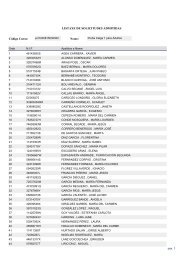Smart Specialization Strategies: Concept, Framework and Design
Smart Specialization Strategies: Concept, Framework and Design
Smart Specialization Strategies: Concept, Framework and Design
Create successful ePaper yourself
Turn your PDF publications into a flip-book with our unique Google optimized e-Paper software.
<strong>Smart</strong> <strong>Specialization</strong> <strong>Strategies</strong>:<br />
<strong>Concept</strong>, <strong>Framework</strong> <strong>and</strong> <strong>Design</strong><br />
Diego Martínez López<br />
S3 Platform, IPTS (DG JRC), European Commission<br />
<strong>Smart</strong> <strong>Specialization</strong> <strong>Strategies</strong>:<br />
<strong>Concept</strong>, <strong>Framework</strong> <strong>and</strong> <strong>Design</strong><br />
Santiago de Compostela, 21st May 2013
OUTLINE<br />
1.<strong>Smart</strong> specialisation: the concept <strong>and</strong><br />
challenges<br />
2.Steps towards a successful <strong>Smart</strong><br />
Specialisation Strategy<br />
3.The S3 Platform: background <strong>and</strong> activities
What does "smart specialisation" really mean<br />
What is <strong>Smart</strong> Specialisation <br />
= evidence-based<br />
= no top-down decision, but<br />
dynamic/entrepreneurial discovery<br />
process inv. key stakeholders<br />
= global perspective on potential<br />
competitive advantage & potential<br />
for cooperation<br />
= priority setting in times of scarce<br />
resources<br />
= getting better / excel with something<br />
specific<br />
= focus investments on regional<br />
comparative advantage<br />
= not necessarily focus on a single<br />
sector, but cross-fertilisations
What does "smart specialisation" really mean<br />
It means avoiding duplication <strong>and</strong> fragmentation of<br />
effort with scarce public resources within the Union.<br />
It means being selective <strong>and</strong> support the R&I activies<br />
that are relevant in view of existing conditions <strong>and</strong><br />
assets<br />
It is not « café para todos » (« coffee for all »): it<br />
implies policy choices <strong>and</strong> breaking away from<br />
established lobbies <strong>and</strong> rent-seekers.
National vs regional strategies: Which level<br />
Functional regions in terms of Science, Technology <strong>and</strong><br />
Innovation (STI) policy may not match<br />
administrative/political boundaries of regions<br />
There is a number of formal criteria to make explicit<br />
which are the roles of national <strong>and</strong> regional governments<br />
in terms of STI policy: Constitution, S&T laws, other laws<br />
<strong>and</strong> regulations, etc. …<br />
…but there may be de facto asymmetric decentralisation<br />
due to differences in regional capacity, financial or<br />
otherwise, even within the same country
National vs regional strategies: Which level<br />
There has been a trend towards an increased regional<br />
share over total country STI spending. Recent economic<br />
crisis does not seem to have modified substantially this<br />
pattern<br />
Certain STI policy instruments are reported to be more<br />
commonly used at one level relative to another<br />
(OECD)…<br />
…but country structure (federal, administrative regions,<br />
unity elected regions, etc.) does not seem to be<br />
determinant by clarifying this issue.
National vs regional strategies: Which level<br />
Horizontal coordination (across governments at the<br />
same level) is becoming a powerful strategy to generate<br />
positive synergies <strong>and</strong> efficient results<br />
Mechanisms for regular dialogue are generally<br />
considered among the most important tools in many<br />
country. They can build useful relationships <strong>and</strong> promote<br />
information sharing as well.
Entrepreneurial process of discovery<br />
What a region can be good at producing In economics,<br />
this question cannot be empirically answered...BUT....<br />
…entrepreneurship becomes a key issue to determine<br />
competitive advantages <strong>and</strong> capturing niches of<br />
innovation<br />
But uncertainty <strong>and</strong> other problems: entrepreneurship<br />
<strong>and</strong> innovation are not determined in st<strong>and</strong>ard<br />
competitive markets, information asymmetries, lack of<br />
prices, private incentives damaging social welfare (i.e.,<br />
through lobbies <strong>and</strong> rent-seeking), etc.
Entrepreneurial process of discovery<br />
In a nutshell, how can policy-markers be oriented by the<br />
entrepreneurs One challenge <strong>and</strong> one risk (at least):<br />
The challenge: why entrepreneurs are willing to share<br />
their plans, new ideas, new processes or methods, etc.<br />
The risk: maybe some of them are looking for rents<br />
Political <strong>and</strong> financial support<br />
Heterogenous experiences
Entrepreneurial process of discovery<br />
Just a proposal: Martinez <strong>and</strong> Palazuelos (2013).<br />
Theoretical model + Empirical checks + Policy tools<br />
Idea: To follow-up the entrepreneurs that make less<br />
mistakes by predicting key economic variables.<br />
Incentives by policy-makers <strong>and</strong> entrepreneurs are<br />
(more) alligned: the latter, making real (<strong>and</strong> committed)<br />
choices on dem<strong>and</strong>s for factors <strong>and</strong> others, reveal how<br />
good they are when make expectations they can be<br />
used by the policy-makers as a guide
Key steps for developing a RIS3<br />
Step 1 – Analysis of regional context/potential<br />
Step 2 – Governance<br />
Analysis<br />
Step 3 – Vision for the future<br />
Monitoring<br />
Process<br />
Step 4 – Selection of priorities<br />
RIS3<br />
Step 5 – Policy mix<br />
Policy mix<br />
Vision<br />
Step 6 – Monitoring <strong>and</strong> evaluation<br />
Priorities<br />
11
Step 1 – Analysis of regional context <strong>and</strong><br />
potential for innovation (I)<br />
Assess existing regional<br />
assets<br />
Identify regional competitive<br />
advantage<br />
Combine methods
Step 1 – Analysis of regional context –<br />
looking out – <strong>and</strong> potential for innovation (II)<br />
Outward-looking<br />
Analysis<br />
Flows of:<br />
o knowledge<br />
o skills
Step 1 – Analysis of regional context <strong>and</strong><br />
potential for innovation (III)<br />
Entrepreneurial<br />
dynamics<br />
Future opportunities<br />
Involvement of different<br />
types of actors
Step 2 – Governance<br />
Ensuring participation<br />
<strong>and</strong> ownership<br />
Collaborative<br />
leadership<br />
Governing bodies
Step 3 – Shared vision<br />
Developing an overall<br />
vision of the region’s<br />
future<br />
Produce a positive<br />
tension towards the<br />
future
Step 4 – Identification of priorities<br />
Where top-down meets<br />
bottom-up<br />
Limited number of areas<br />
Avoid capture by interest<br />
groups!
Implementation, definition<br />
of :<br />
o a coherent policy mix<br />
o roadmaps<br />
o action plan<br />
Step 5 – Policy mix
Step 6 – Monitoring <strong>and</strong> evaluation<br />
Integration of mechanisms for:<br />
o Monitoring <br />
o Evaluation <br />
Measurable targets <strong>and</strong> indicators (profiling,<br />
result/outcome indicators (not output)
Launched in June 2011<br />
The S3 Platform<br />
http://s3platform.jrc.ec.europa.eu<br />
Team of JRC-IPTS, European Commission<br />
Steering Team incl. different DGs: REGIO, RTD, ENTR,<br />
EAC, INFSO, SANCO, AGRI, CLIMA
Main activities of S3 Platform in support of the<br />
countries/regions preparing RIS3<br />
7. Research<br />
agenda<br />
1. The RIS3<br />
methodological<br />
Guide<br />
6. Newsletter <strong>and</strong><br />
Website with special<br />
access for regions &<br />
interactive tools<br />
2. Peer Review<br />
workshops & transnational<br />
learning<br />
5. Thematic<br />
workshops &<br />
working groups<br />
4. RIS3 assessment<br />
<strong>and</strong> support to DG<br />
REGIO<br />
3. Outreach & Country<br />
Events (Seminars in<br />
Member States & EU<br />
Macro-regions)
FRANCE<br />
• Alsace<br />
• Aquitaine<br />
• Bretagne<br />
• Centre<br />
• Champagne-Ardenne<br />
• Corse<br />
• Guadalupe<br />
• Guyane<br />
• Languedoc-Rousillon<br />
• La Réunion<br />
• Limousin<br />
• Martinique<br />
• Nord-Pas-de-Calais<br />
• Picardie<br />
• Rhône-Alpes<br />
ITALIA<br />
• Lombardia<br />
• Marche<br />
• Piemonte<br />
• Puglia<br />
• Sardinia<br />
• Emilia-Romagna<br />
• Toscana<br />
• Umbria<br />
• Veneto<br />
• Sicily<br />
• Basilicata<br />
• Campania<br />
• Liguria<br />
LITHUANIA<br />
MAGYARORSZÁG<br />
BELGIQUE<br />
• North-Hungarian Region– Miskolc<br />
• Région de Bruxelles-Capitale • Észak-Alföld • Dél-Alföld<br />
• Vla<strong>and</strong>eren<br />
MALTA<br />
NEDERLAND<br />
• Wallonia<br />
• Noord Nederl<strong>and</strong><br />
ČESKÁ REPUBLIKA<br />
ÖSTERREICH<br />
• Jihomoravský kraj<br />
• Capital City of Prague<br />
DEUTSCHLAND<br />
• Niederösterreich<br />
• Oberösterreich<br />
POLSKA<br />
• Berlin<br />
• Dolny Śląsk (Lower Silesia)<br />
• Lubelskie<br />
• Br<strong>and</strong>enburg<br />
• Lubuskie<br />
• Freistaat Sachsen<br />
• Mazowieckie<br />
• Weser-Ems<br />
• Podkarpackie<br />
• Sachsen-Anhalt<br />
ELLADA<br />
• Attiki<br />
• Eastern Macedonia <strong>and</strong><br />
• Pomorskie<br />
• Świętokrzyskie<br />
• Wielkopolska<br />
• Województwo Podlaskie<br />
• Kujawsko-Pomorskie<br />
Thrace<br />
• Łódzkie<br />
• Western Greece<br />
• Warminsko-Mazurskie<br />
• Crete<br />
• Małopolskie<br />
ESPAÑA<br />
• Andalucía • Aragón<br />
PORTUGAL<br />
• Alentejo (Alto, Baixo, Central e Litoral)<br />
• Canarias<br />
• Cantabria • Centro<br />
• Galicia<br />
• La Rioja<br />
• Norte<br />
• Região Autónoma dos Açores<br />
• Madrid<br />
• Navarra<br />
• Lisboa e Vale do Tejo<br />
• País Vasco<br />
• Algarve<br />
• Principado de Asturias<br />
• Región de Murcia<br />
• Região Autónoma da Madeira<br />
ROMÂNIA<br />
• Illes Baleares<br />
• Vest<br />
SLOVENSKÁ REPUBLIKA<br />
• Extremedura<br />
• Bratislavský kraj<br />
• Castilla y León<br />
SLOVENIA<br />
• Castilla-La Mancha<br />
SVERIGE<br />
• Catalunya<br />
• Comunidad Valenciana<br />
FINLAND<br />
• Skåne<br />
• Västerbotten<br />
• Västra Götal<strong>and</strong><br />
UNITED KINGDOM<br />
• Kainuu<br />
• Oulu • Buckinghamshire<br />
• Päijät-Häme • Uusimaa • Cornwall <strong>and</strong> the Isles of Scilly<br />
• PohjaEtelä-Pohjanmaa<br />
(Ostrobothnia)<br />
• Kent<br />
• Northamptonshire<br />
• Satakunta • Lapl<strong>and</strong> • Northern Irel<strong>and</strong><br />
• Etelä-Pohjanmaa (South<br />
• West Midl<strong>and</strong>s<br />
• Wales<br />
Ostrobothnia)<br />
• Devon<br />
• Tampere region<br />
NORWAY • Nordl<strong>and</strong><br />
Over 115 registered regions<br />
Over 115 + registered 6 countriesregions<br />
+ 6 countries<br />
Register here:
The RIS3 Guide<br />
Edited by JRC IPTS in association with<br />
DG REGIO <strong>and</strong> with contributions from:<br />
<br />
<br />
<br />
D. Foray, P. McCann, J. Goddard,<br />
K. Morgan, C. Nauwelaers, R. Ortega<br />
Commission officials from various DGs<br />
S3 Platform research team<br />
Target group: policy-makers, academics,<br />
innovation support providers<br />
Available on the S3 Platform webpage<br />
http://s3platform.jrc.ec.europa.eu
Peer Review Exercises<br />
1° Workshop in Sevilla (Jan 2012)<br />
2° Workshop in Sevilla (May 2012)<br />
3° Workshop in Ponta Delgada (June 2012)<br />
4° Workshop in Pisa (Sept 2012)<br />
5° Workshop in Strasbourg (Dec 2012)<br />
6° Workshop in Palma de Mallorca (Feb 2013)<br />
7° Workshop in Brno (Mar 2013)<br />
8° Workshop in Vaasa (May 2013)<br />
9° Workshop in Germany/Hungary
• Features:<br />
RIS3 Peer Review Methodology<br />
• - Structured <strong>and</strong> focused presentations<br />
• - switching roles<br />
• - concentrating peer-learning in space & time<br />
• - integrating expertise/knowledge from a variety of<br />
sources
Informal RIS3 assessment<br />
How it works in practice<br />
Informal exercise on volunteer basis, based on the RIS3 guide<br />
<strong>and</strong> its Annex III (expert assessment questionnaire)<br />
Procedure:<br />
• Regions submit their RIS3 to DG REGIO<br />
• Expert assessment by an expert appointed by DG REGIO<br />
• Complementary assessment by S3 Platform focusing on the main<br />
« novelties » of the RIS3 approach + assessment wheel<br />
• Feedback to the regions facilitating their path towards a full RIS3
S3 Platform support: streamlined “easy-to-use” assessment tools<br />
which ensure consistency with methodological approach<br />
RIS3 Guide<br />
Assessment Report (AR) with the<br />
Assessment Wheel (AW)<br />
Analysis<br />
5<br />
Monitoring<br />
Governance<br />
4<br />
3<br />
2<br />
RIS3<br />
1<br />
0<br />
Policy mix<br />
Vision<br />
Priorities
Thank you for your attention!<br />
http://s3platform.jrc.ec.europa.eu



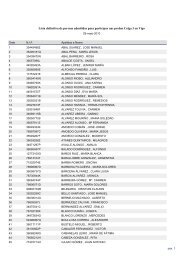
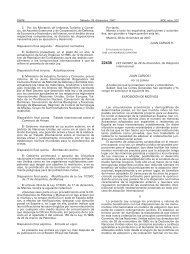
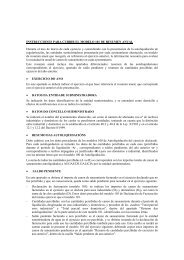

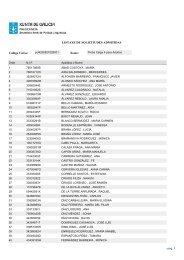
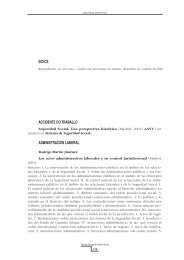
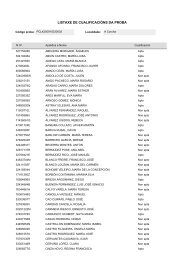
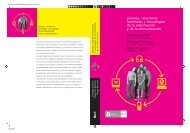



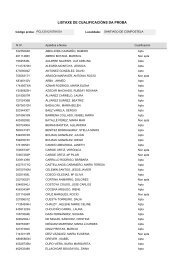
![BULGARIA: contrato de intermediación-MIMO [PDF] - Xunta de Galicia](https://img.yumpu.com/32676180/1/184x260/bulgaria-contrato-de-intermediacian-mimo-pdf-xunta-de-galicia.jpg?quality=85)
